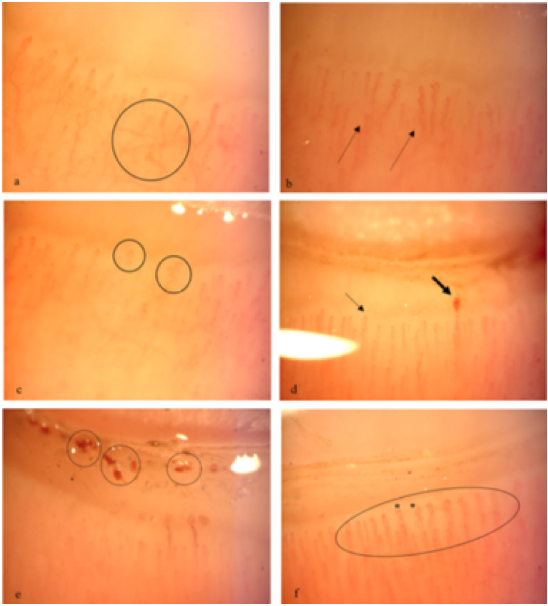Session Information
Date: Monday, November 8, 2021
Session Type: Poster Session C
Session Time: 8:30AM-10:30AM
Background/Purpose: Capillaroscopy has gained increasing importance in the microvascular assessment of rheumatic diseases (1). Increased cardiovascular risk has been observed in psoriatic arthritis (PsA) (2). Recent data suggest microvascular involvement (3). Few studies have analyzed capillaroscopic anomalies in PsA. No specific capillaroscopic pattern has yet been identified (4-6). Conditions that can affect the nail bed vasculature were not always excluded. The objective of this study was to determine capillaroscopic abnormalities in patients with PsA with no cardiovascular risk factors or other conditions that could interfere with nailfold capillaroscopy results.
Methods: We conducted a cross-sectional study on 13 patients diagnosed with PsA according to CASPAR Classification criteria. We excluded all patients with concomitant cardiovascular risk factors or conditions known to alter the nail bed capillaries including concomitant cardiovascular risk factors, coexistent connective tissue disorder, primary or secondary Raynaud’s phenomenon, chronic kidney disease, current malignancy, pregnancy or lactation and vasoactive or anticoagulant therapies. Patient characteristics and disease activity score (DAPSA) were collected. Main outcome was the presence of any capillaroscopic abnormality on nailfold capillaroscopy performed by the same physician. Association with disease duration and activity was tested using Chi Square test for categorical variables and Mann-Whitney U test for continuous variables.
Results: Mean (+/-SD) age was 46 years +/- 13.5, mean disease duration 17 years +/- 15.2; 54.0% were men. None of the patients had distal interphalangeal joint involvement, mean DAPSA score was 23.36 +/- 19.5. 70,0% had cutaneous psoriasis and 54.0% had ungual involvement. All patients had capillaroscopic abnormalities (figure 1). The 3 most common findings were: tortuosity (84.6%, mean of 4 tortuous loops for a density of 8 loops/mm), reduced capillary density (50.0%, mean density of 8 +/- 1 loops/mm) and microhaemorrhages (38.5%). Less frequent findings were perivascular oedema (30.8%), ramifications (15.4%), dilated loops (15.4%), and visibility of subpapillary plexus (15.4%). We a small study population, we were unable to document statistical association between capillaroscopic findings and disease duration (p < 0.4) or DAPSA (p < 0.42).
Conclusion: PsA patients exhibit capillaroscopic abnormalities characterized by the presence of tortuosity, reduced capillary density and microhaemorrhages, independent from potential conditions that may alter the nailfold capillaries. Larger studies are needed to identify specific capillaroscopic patterns in PsA and to reflect on the prognostic value of our findings.
References:
(1) Dima A. et al, Romanian Journal of Internal Medicine 2021
(2) Tinggaard AB. et al, J Intern Med 2021
(3) Bhushan M. et al, Br J Dermatol 2000; 142(6): 1171-6
(4) Graceffa D. et al, Arthritis 2013; 2013: 957480
(5) Errichetti E. et al, J Dermatol 2016; 43(10):1217-1220
(6) Ali A., The Egyptian Rheumatologist 2019; 41(4):303-307
 Figure 1: Nailfold capillaroscopic abnormalities in patients with psoriatic arthritis. a) Visibility of subpapillary plexus highlighted in the circled area. b) Long arrows point to tortuous loops. c) Circled areas highlight perivascular edema. d) Bold arrow points to a microhemorrhage. Normal arrow points to a tortuous loop. e) Circled areas highlight multiple microhemorrhages. f) Circled area shows many tortuous loops.
Figure 1: Nailfold capillaroscopic abnormalities in patients with psoriatic arthritis. a) Visibility of subpapillary plexus highlighted in the circled area. b) Long arrows point to tortuous loops. c) Circled areas highlight perivascular edema. d) Bold arrow points to a microhemorrhage. Normal arrow points to a tortuous loop. e) Circled areas highlight multiple microhemorrhages. f) Circled area shows many tortuous loops.
To cite this abstract in AMA style:
Ghossan R, Chouman N, aouad k, Jammal M, Baddoura R, Aitisha O, Okais J, Fayad F. Assessment of Microvascular Involvement in Psoriatic Arthritis by Nailfold Capillaroscopy [abstract]. Arthritis Rheumatol. 2021; 73 (suppl 9). https://acrabstracts.org/abstract/assessment-of-microvascular-involvement-in-psoriatic-arthritis-by-nailfold-capillaroscopy/. Accessed .« Back to ACR Convergence 2021
ACR Meeting Abstracts - https://acrabstracts.org/abstract/assessment-of-microvascular-involvement-in-psoriatic-arthritis-by-nailfold-capillaroscopy/
